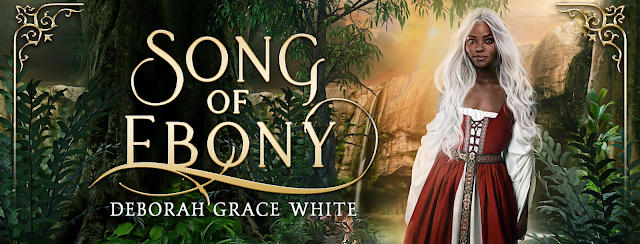Review: Song of Ebony (Singer Tales)
From the cover alone, it's clear that Song of Ebony is a creative take on your average "Snow White" retelling. Instead of the traditional skin as white as snow and hair as black as ebony, this story presents a protagonist with skin as black and ebony and hair as white as snow. This rare combination insinuates innate supernatural abilities like Storm from the X-Men. The unique properties of this book go beyond mere aesthetics. Deborah Grace White's earlier books were somewhat generic fantasy stories, which is why I never read past the first book in her Kingdoms series of fairy tale anthologies. Since then, she has really managed to hone her craft, especially with her top-notch mermaid series, The Vazula Chronicles that I've been shamelessly recommending to anyone who likes mermaids. When I found out that Deborah was starting a new fairy tale anthology called The Singer Tales, I couldn't wait to find out what was in store.
Song of Ebony is the premiere book in The Singer Tales, a new anthology of fairy tale retellings that focus on princesses with magical singing abilities. I love how this concept is a subtle reference to Gail Carson Levine's Fairest, one of my favorite "Snow White" adaptations from before the fairy tale retelling craze took the independent publishing world by storm. With the theme of magical singing abilities, it's no surprise that the next book in this series is Song of the Sea, which will be based on "The Little Mermaid," my favorite fairy tale. This upcoming book was heavily foreshadowed in Song of Eboy, which is a wonderful fantasy take on "Snow White." Bianca is a magical princess with snow-white hair that serves as a visual representation of the singing abilities that she denies having for most of the book. Instead of seven dwarfs, she encounters seven elves who place her under their protection when they learn that her stepmother is trying to kill her. And that's just the beginning of this magical story.
What I love most about Deborah Grace White's other recent works is how much care she puts into building a rich and believable fantasy world. This story takes place in a land of animosity between humans and elves caused by jealousy of their varying magical abilities. In this world, the natural ground is fatal to most humans because it is filled with wild magic, and humans, who are mostly non-magical, don't have the capacity to handle that level of power. As a result, human lodgings are built above ground in the treetops. When Princess Bianca is seen plummeting to the ground after her stepmother's orders to kill her, she is presumed to be as good as dead, yet she miraculously survives. This causes her to cross paths with another human who survived on the ground of her kingdom, a young prince named Farrin, who provides shelter for her among his elf companions. I appreciate that the story only focused on two of the seven elves because it would have been difficult to try to keep track of all of them. Lurgl is the leader who was slighted by the rest of the elven kind, and Dionysius is this book's equivalent of Grumpy who doesn't trust Bianca and hates having her around.
This adaptation does a fantastic job of staying true to the original story in spite of all of the creative changes. Marisol, Bianca's stepmother, was vain and power-hungry and took some despicable measures to become queen and get rid of the king. Like in the fairy tale, there are three attempts on Bianca's life--one with a ribbon that wraps around her body like an over-tightened corset, one with a poisoned comb, and one with a poisoned apple. It even includes the part about only poisoning half the apple so that the stepmother can take a bite out of the green half to prove that it's safe and convince Bianca to eat the poisoned red half. The book also has the same moral of being careful about who you trust. Bianca is painfully aware that her trusting nature might get her killed someday, yet no matter how much she tries to change it, Marisol continues to find new ways to bypass Bianca's newfound cynicism. I also liked how the romance between Bianca and Farrin was built up from the beginning of the book without changing too much of the original story.
If you are a fan of "Snow White" and want something a little different, Song of Ebony is a must-read. It flips the script on the original fairy tale just enough to be unique without ruining what made it such a good story in the first place. I love how the white hair provides an opportunity to change Snow White's skin color without drastically altering the story, something that Disney did not seem to do with their upcoming remake. The world-building in this book is fantastic and makes me eager to read the rest of the series, especially the upcoming "Little Mermaid" adaptation. Deborah Grace White put a great deal of thought into the magic system and the setting in which these books take place. This is one fairy tale series you don't want to miss out on.












Comments